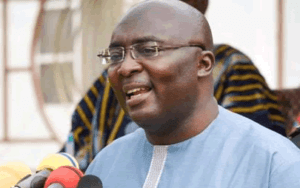Explore alternative sources of funding pension schemes – Bawumia

Vice President Dr Mahamudu Bawumia has underscored the need for stakeholders in the pension management in the country to explore alternative sources of funding pension schemes without any entrenched positions.
He said future governments would not have to resort to borrowing to pay pension benefits with its accompanying interest cost, noting that any government that borrows to pay retirement benefits could not build a resilient economy.
He therefore called for prudent management of the country’s pension resources, adding “it is imperative to unify the fragmented pension schemes to ensure fairness, equity and sustainable management of pensions”.
He said to prevent any future legal tussle and disruption to the operations of pensions in the country, there was urgent need to bring finality to the long-standing conversations on unifying pension schemes to resolve the pension benefit disparities in the pension administration.
Vice President Bawumia said this at a high-level stakeholders meeting on unification of the pension schemes in the public sector, in Accra on Wednesday.
The meeting organised by the Ministry of Employment and Labour Relations, brought together experts in pension management, to brainstorm on the best strategy to unify the various pension schemes in the country to ensure equity and sustainability.
The participants were drawn from the Trades Union Congress, National Labour Commission, Public Services Commission and Fair Wages and Salary Commission.
The rest included; representatives from the pension schemes, Office of the President, Majority and Minority Leaders of Parliament, National Regulatory Authority, the Cabinet Economic Committee, Social Security and National Insurance Trust and the Controller and Accountant General’s Department.
The National Pensions Act, Act 766 of 2008 as amended by Act 883 of 2014 says all institutions operating parallel pension schemes in the public sector are supposed to be unified under the three-tier pension scheme.
However, it has been observed that new employees in the public sector rather joined the non-contributory scheme like CAP 30 thereby making funding unsustainable and burdensome on government budget.
Vice President Bawumia said in 2016, the estimated amount paid in pensions to those under the contributory scheme (Social, Security and National Insurance Trust) was GH¢1.75 billion with the average annual benefit per member wasGH¢10,041. 00 with monthly pension benefit of GH¢837.00
For those under the non-contributory scheme (CAP 30) it was GH¢900 million for 77,877 pensioners with an average annual benefit of GH¢11,560.00 with a monthly pension benefit of GH¢963.00.
Therefore analysis of the average pension benefit of the two schemes showed that those under the contributory scheme were receiving GH¢127.00 less than the pensioner under the non-contributory scheme, with the gap widening to GH¢222.00 in 2017 and projected to further widen over time.
In that regard, Dr Bawumia said, it had become imperative to harmonise the fragmented schemes in the country to create prosperity and equal opportunities for the citizens to engender rapid economic transformation in line with the government’s vision of building Ghana beyond Aid.
He said retiring from active employment was inevitable for both workers in the formal and non-formal sectors of the economy, noting that, the issue of unifying the pension schemes was critical.
“Pensions in this country remains fragmented, difficult to administer and discriminatory and non-equitable while some existing pension schemes may have been operating in a legal vacuum and at risk of legal interpretation dispute that can affect the people involved,” he said.
Vice President Bawumia noted that globally, pensions had become one of the most important social safety net as most common form of social protection in view of the gains in life expectancy.
“The older population in most countries is growing and likely to grow further than the population as a whole with decline in fertility,” he said.
The Vice President said the percentage of the Ghanaian population over 60 years was projected to rise from about eight per cent to 10.6 per cent by the year 2020, and rise sharply to about 16 per cent by 2050.
According to the World Health Organisation, the global life expectancy has risen from 50 years in 1970s to 56 in 1990 and 65 in 2015 as a result of improvement in public health measures, personal hygiene and nutrition.
The Vice President noted that despite the improvement in life expectancy worldwide, it behoved on policy-makers to anticipate measures for possible solutions to pensions.
Source: GNA
